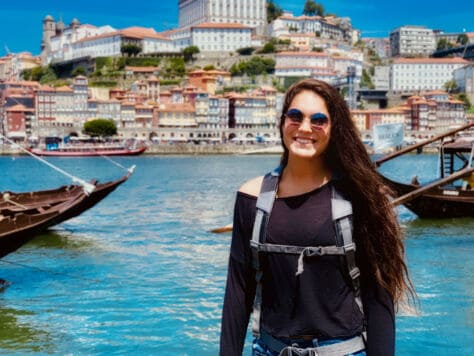WASHINGTON, PA (Dec. 10, 2019) — The first thing you’ll learn when you meet Washington & Jefferson College (W&J) junior Marcy Saldivar ’21 is that helping others is her biggest passion.
Since a young age, Marcy dreamed of going to college for scientific research that could help her impact communities on a large scale. She found everything she was looking for at W&J as a neuroscience and gender and women’s studies double major.
Through the Magellan project, Marcy has been able to jump start her goal of using scientific research to help others.
For five weeks this past summer, Marcy visited six cities in Portugal, studying their policies and social attitudes towards disabilities. This research is personal to Marcy, whose younger sister has Down syndrome.
“My entire life I have dreamt about giving back to the Down syndrome and disabled communities,” she said.
When planning her project, Marcy knew all the support systems her sister had, from her teachers to her therapists to her family and friends. “Unfortunately, disabled children in other regions of the world aren’t so lucky,” she said.
While there, she interacted with the organizations Riding for the Disabled and The Disability and Human Rights Observatory (ODDH).
Riding for the Disabled provides horse riding activities to handicapped children and young adults. Marcy volunteered alongside a therapeutic team to help guide the horses the participants rode on.
“The atmosphere was very welcoming and supportive to the kids. This hands-on experience made me appreciate emotional support animals, specifically horses, because their serenity calmed down the children with special needs,” Marcy said.
While volunteering at Riding for the Disabled, Marcy spoke with their head coordinator, Kathryn Watson, about both the physical and psychological benefits that come along with the kids being able to participate in an activity that they may not otherwise have been able to. They feel proud that they are able to be situated on an elevated horse.
ODDH aims to teach people about disability and human rights through workshops, seminars and conferences. They complete this with a multidimensional approach, comprising of information, training research and policy advice. They also research disability and human rights with higher education institutions and esteemed disability organizations.
While there, Marcy met with Dr. Paula Pinto, an associate professor and coordinator at ODDH. Dr. Pinto talked to her about the policies in place when it comes to disability. However, a lot of them are not implemented due to lack of training and resources.
Dr. Pinto also shared that accessibility for those living with disabilities is an issue with Portugal’s current infrastructure. Just one example she shared was a lack of wheelchair accessible buses, meaning that those in need of accommodation may wait for up to five buses to come and go before they are able to ride.
After interacting with both organizations and speaking with Dr. Pinto, Marcy believes that Portugal has the ability to enact change. She learned that the government plans to implement an independent living program for those with disabilities. Once initiated, the program will help citizens with disabilities live in group complexes or by themselves.
“As Western society continues to progress, I think Portugal will have no choice but to update its policies,” Marcy said.
After graduation, Marcy plans to find a career that helps her give back to the special needs and disabled communities that have become marginalized.
Learn more about Marcy’s research through her Magellan Project blog.



